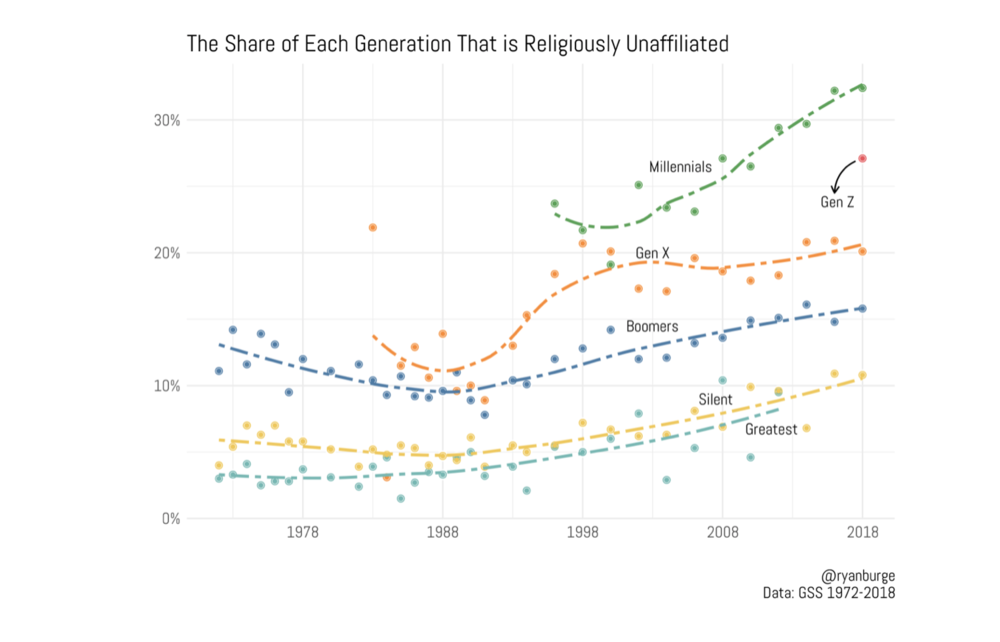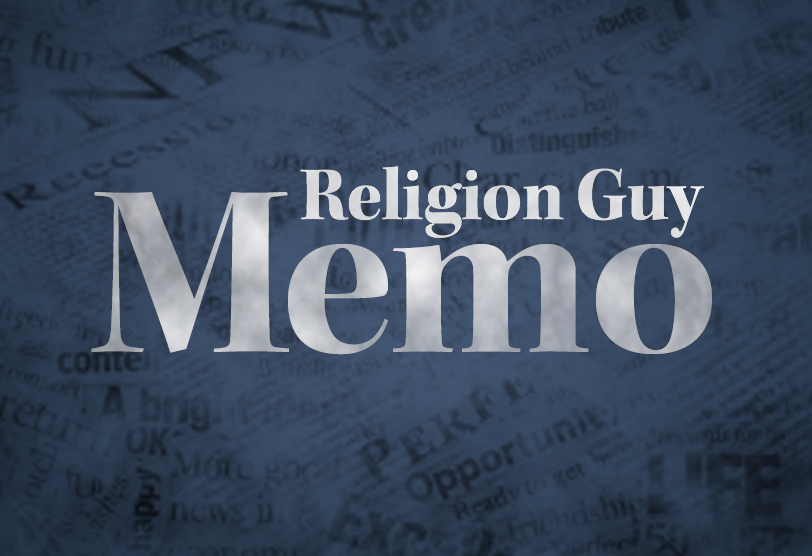
The steep rise of Americans who tell pollsters they lack any religious identity or affiliation, the so-called “nones,” was among the country’s top religion stories of the decade past. If that increase is now stalling, it’s a hot candidate for top trend of the 2020s. But hold on.
Journalists should be covering (with accompanying graphs), or at least carefully watching, this highly important discussion, which broke this past week online by social-science scholars. The stall scenario was asserted by Melissa Deckman of Washington College and immediately pursued by GetReligion contributor Ryan Burge of Eastern Illinois University and Religion in Public co-author Paul Djupe of Denison University.
GetReligion honcho tmatt (as usual) was on top of this. But then Joseph Baker of East Tennesse State University doused some cold water on the optimistic scenario.
Writers will need to examine these articles for themselves, but let’s unpack the debate a bit for those just tuning in.

In the common lingo for age cohorts, the “Greatest Generation” that survived the Depression and World War Two was followed by the “Silent Generation” and then the “Baby Boomers.” Problems for organized religion — even during adult marriage-and-parenting years — zoomed with the “Millennial” generation, usually defined as Americans born between 1981 and 1996. The current debate compares them with the next cohort born after 1996, the “Post-Millennials” or “Generation Z.”
Deckman collected data on 2,200 Gen Z subjects drawn from a Qualtrics Panels political survey last year. This was not a strictly random sample, but results were weighted by Pew Research benchmarks for gender, race or ethnicity, and income, to match the demographic makeup of this population.
With Gen Z, 38 percent were religiously unaffiliated, surely a troublesome number. However, that was the identical percentage with the earlier cohort of Millennials in a 2016 Public Religion Research Institute study, hinting at a plateau. Only 25 percent of Gen Z-ers attended worship on a weekly basis (but 36 percent among African Americans) compared with a 2014 Pew Research survey showing only slightly more twith Millennials, 27 percent.
Her tentative conclusion: “It appears that the rate of younger Americans departing from organized religion is holding steady,” rather than getting worse as many strategists fear.
Burge and Djupe proclaimed it a “bombshell” if “the probability of being a religious ‘none’ in Gen Z” is the same as among the Millennials. They pursued the theme and found similar patterns in three other standard social-science resources, the annual General Social Survey, the 2018 Cooperative Congressional Election Study, and PRRI’s four-year American Values Atlas. They concluded that “the population rate of the religious unaffiliated is at least leveling off and may be contracting,” offering interesting speculations on possible reasons why.
However, they also warned us that the results so far are “only suggestive” and we’re only at the beginning of Gen Z reaching adulthood so trends could change.
This hesitation is reinforced by Baker, who sees “reasons to be cautious about claiming that the ‘nones’ are slowing in their growth.”
Baker cites surveys showing Gen Z members are more likely to identify as agnostics or atheists than older generations, and more likely to harbor religious doubts. He also predicts more will become “nones” as they grow older because that’s what has happened with Millennials. Also, Gen Z youths report praying less frequently than Millennials. However, perhaps surprisingly, Gen Z early on is showing an increase over Millennials for those reporting regular worship attendance.
Baker’s summation: “Non-theism and indifference are continuing to increase, and we can reasonably expect this to continue as the Gen Z cohort ages and matures. This remains to be seen, though, as this cohort remains very young.”
Journalists’ contact info: Baker is at bakerjo@etsu.edu and 423-439-6648, Burge at rpburge@eiu.edu and 314-884-1450, Deckman at mdeckman2@washcoll.edu and 800-422-1782 ext 7494, and Djupe atdjupe@denison.edu.










